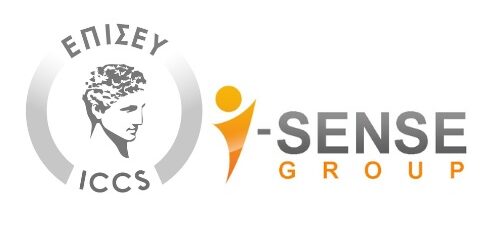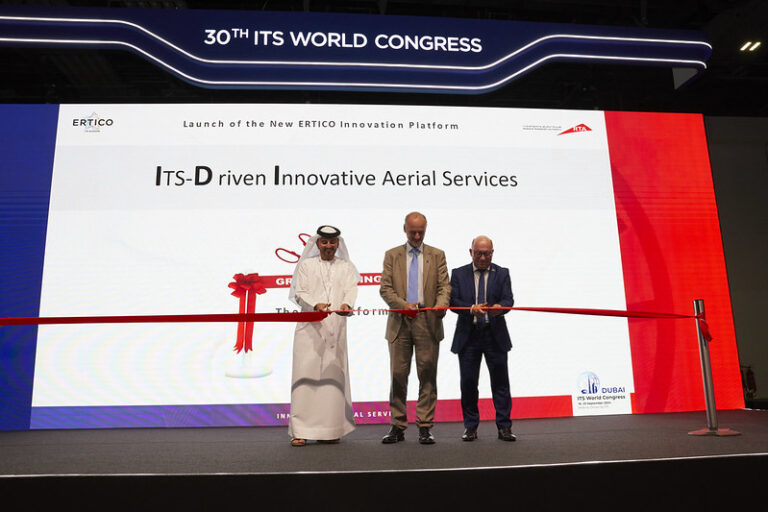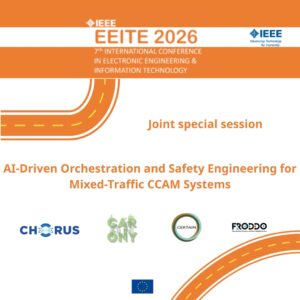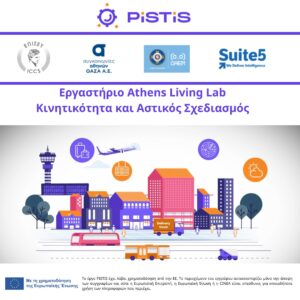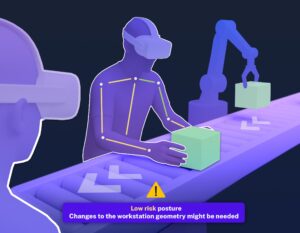ERTICO – ITS Europe officially launched its new Innovation Platform ‘ITS Driven Innovative Aerial Services’ (IDI) at the 30th ITS World Congress in Dubai. ERTICO representatives, Chairman Dr Angelos Amditis (also R&D director of ICCS), CEO Joost Vantomme, Director of Strategy & Innovation, Vladimir Vorotovic, and Senior Manager Innovation & Deployment, Dr Vassilis Agouridas, and with support of the host Roads and Transport Authority, Khaled Al Awadhi, Director of the Transportation Systems Department, delivered their introductory remarks on this new ITS-Driven IAS which will aim to accelerate the deployment of a secure, resilient, and sustainable multi-modal mobility and public services network by integrating ground, air, and subterranean transport systems.
By supporting the development of Innovative Aerial Services (IAS), the founding members, ICCS, SAE International, Continental, City of Hamburg and Satellite Applications Catapult, will aim to nexus of collaboration and innovation, focusing on the intersection of Intelligent Transport Systems (ITS) and cutting-edge aerial services, including drone technologies and autonomous systems. Founded on the multi-faceted quadruple helix model of innovation, engaging with the Public Sector/Government, Industry, Academia and Society, this platform will adopt a holistic approach to fully integrate, in a responsible and sustainable manner, innovative aerial services into ITS-driven deployments within the transport, mobility and public services context. The platform will focus on key concepts such as Urban Air Mobility (UAM), Innovative Air Mobility (IAM), Advanced Aerial Mobility (AAM), Unmanned aircraft system Traffic Management (UTM) and U-space.
The IDI Platform will merit society-driven innovation and deployment targeting to bridge cutting-edge aerial services with existing city operations and public services, including the bridging of aerial mobility solutions with existing transport networks. It will safeguard generation of purposeful business opportunities and societal impact for diverse stakeholders across communities throughout Europe and globally.
Beyond its vision of unlocking latent demand and accelerating purposeful deployment towards more accessible and sustainable transport solutions and public services in urban and regional areas, the IDI Platform will leverage synergies between the innovation and business ecosystems of ITS and IAS. As a new Innovation & Deployment Platform, the IDI Platform builds upon the collective expertise and resources of ERTICO’s Partnership to address emerging challenges and accelerate the development of ITS-Driven IAS. By leveraging the synergies, the IDI Platform aims to unlock new opportunities for enhancing urban and regional, connectivity, accessibility and well-being in terms of mobility and critical public services.
The IDI Platform will address a broad spectrum of services, from individual travel information and adaptive traffic management to city operations such as emergency medical services and surveillance of critical infrastructure, and connectivity of remote areas. It will also seek to facilitate the sharing and protection of data, particularly in the realm of traffic management, and ensure convergence and alignment with cross-sectoral regulatory frameworks. A key focus will be placed on the adoption and development of standards and the integration of drones and aerial mobility into existing infrastructure. Objectives:
- Facilitate multi-stakeholder collaboration to drive the deployment of ITS-driven IAS solutions.
- Address regulatory, technological, environmental, and societal challenges linked to aerial mobility by leveraging on ITS advances.
- Promote the harmonisation of cross-sectoral standards and multilevel governance frameworks to enable responsible and sustainable IAS growth.
- Explore and facilitate collaborative business innovation through public-private partnerships.
- Establish local living labs to serve as pre-commercial fieldwork for introducing and scaling commercial deployment of IAS.
The launch of the IDI Platform marks an important step towards the realisation of improved public services and a more connected and integrated transport system.
